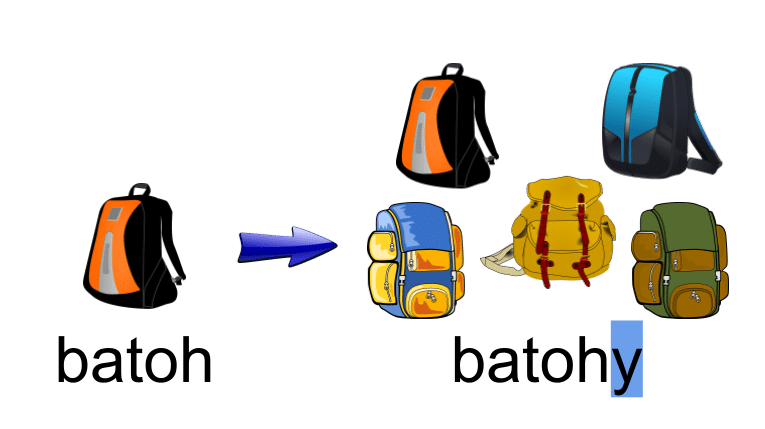1.8 – Making Nouns Plural
In this lesson you will learn how to make things plural in Czech. In English, making a noun plural is relatively simple and is achieved by putting the ending –s or –es (cats, dishes). The rules for forming the plural in Czech are a bit more complex, but not too difficult to master if you pay attention to a few rules. First, here is a table with endings:
|
|
MA |
MI |
F |
N |
|
Hard Stem |
-i
profesoři, studenti, kluci (with consonant mutation, see below)
Američané |
-y
batohy hrady |
-y
tužky, ženy, kočky |
-a
slova, piva, okna |
|
Soft Stem |
-i
sportovci |
-e
počítače |
-e
učebnice, tabule, ulice
|
-e
pole, slunce |
|
|
|
-e
koleje, tramvaje
-i věci
|
-í
náměstí |
Masculine Animate Nouns
We recall from the discussion above that masculine animate nouns are those which refer to humans or animals. The ending for masculine animate nouns is -i, regardless of whether the noun is hard or soft. However, recall from learning the pronunciation rules in 1.2 – Soft Pronunciations that certain consonants were pronounced differently in combination with -i. The plural of kamarád ‘friend’ is kamarádi ‘friends’ and the plural of student ‘student’ is studenti ‘students’. The d and t in these words is pronounced as ť and ď , respectively, because of the pronunciation rule. This is a type of consonant mutation (a change in consonants based on an ending). The ending -i causes some other mutations, based on the following rules ( k →c, h → z, ch → š, r → ř)
Masculine Animate Hard-stem
kluk ‘boy’ → kluci ‘boys’
Čech ‘a Czech’ → Češi ‘Czechs’
pstruh[1] ‘trout’ → pstruzi ‘trout (pl.)’
profesor ‘professor’ → profesoři ‘professors’
Masculine Animate Soft-stem
sportovec ‘athlete’ → sportovci ‘athletes’
Additionally, hard stem masculine animate nouns ending in -an (often with nationalities) and soft stem masculine animate nouns ending in -tel (often with various professions) have the nominative plural ending -é; (Američan → Američané, učitel → učitelé).
Masculine Inanimate Nouns
Masculine inanimate nouns form their plural by adding one of two endings, depending on whether the noun is hard stem or soft stem (see Czech noun stems). Hard stem nouns will add the ending -y, while soft stem nouns will add the ending -e.
Masculine Inanimate Hard-stem
batoh ‘backpack’ → batohy ‘backpacks’
Masculine Inanimate Soft-stem
počítač ‘computer’ → počítače ‘computers’
Feminine Nouns
Feminine nouns also form their plural by adding these two endings, again depending on whether the noun is hard stem or soft stem. Hard stem nouns will add the ending -y, while soft stem nouns will add the ending -e. Remember, the endings are added directly to the stem
Feminine Hard-stem
kniha ‘book’ (stem knih-) → knihy ‘books’
Feminine Soft-stem
učebnice ‘textbook’ (stem učebnic-) → učebnice ‘textbooks’
Feminine Soft-stem (ends in a consonant)
kolej ‘dorm’ (stem kolej-) → koleje ‘dorms’
Feminine Soft-stem (ends in a consonant) -i type
věc ‘thing’ (stem věc-) → věci ‘things’
You’ve probably already noted that the singular and the plural are exactly the same. Context will typically help disambiguate these types of situations.
Neuter Nouns
The endings for neuter nouns are a little different. Hard-stem neuter nouns have the ending -a
Neuter Hard-stem
okno ‘window’ (stem okn-) → okna ‘windows’
Neuter Soft-stem
have either the ending -e or -í, depending on how the noun ends in the singular
moře ‘sea’ (stem moř-) → moře ‘seas’
náměstí ‘squares’ (stem náměst-) → náměstí ‘squares’
Again, the plural is the exact same as the singular. Context will help in determining whether they are singular or plural.
Images used in this document come from these sources.
[1] We don’t in a million years expect you to know the word for ‘trout’ right now (though it will come up in the food chapter since it’s a fish that Czechs frequently consume). There are not a lot of masculine animate nouns that end in -h. However, these consonant mutations will come up again and again in Czech when we learn other forms, so it is good to get the whole set of mutations now.
